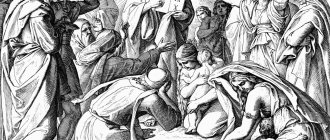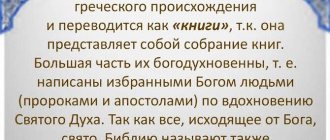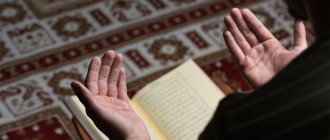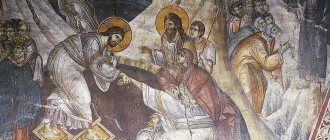- Briefly about the 114th sura “An-Nas”
- Text of Surah "An-Nas" Translation of Surah "An-Nas"
Surah An-Nas is one of the Meccan surahs of the Holy Quran, which includes six verses. The name of Surah 114 is the last word of its first verse “An-Nas”.
Translated from Arabic, the name "An-Nas" means "People" or "Humanity". The very word “An-us” is used in the verses five times, and this emphasizes that Allah Almighty is the Creator of people and their Lord, that people belong to Him, and that the Lord is the Gracious and Merciful Protector of people. The surah says that Allah Almighty is the One Whom humanity, people, should worship.
The essence of Surah An-nas is a call to turn to Allah Almighty for protection, as well as to resist and not give in when tempted by Satan, jinn and people. This surah also talks about the hallmark of Satan - hiding or running away when someone mentions the name of God.
Surah An-Nas was revealed in Mecca. The Prophet Muhammad ﷺ mentioned Surah An Nas, saying that its text, as well as Surah Al-Falyak, contain the best words that people who seek protection from Allah Almighty can pronounce and listen to. Surah An Nas is considered the best prayer for protection against witchcraft and the evil eye, along with some Quranic verses against witchcraft.
Listen and download
Below you can listen online and download in mp3 format the reading of this surah performed by different reciters of the Koran.
- listen online and download Surah An-Nas by reciter Mishari Rashid (mp3 format)
- Sura 114 read by Sheikh Muhammad al-Luhaydan
- reading sura 114 Abu Bakr ash-Shatri
- "An Nas" read by Abdullah al-Matrud
- Surah An Nas read by Saad al-Ghamidi
- Salih al-Hashimi
- Saud al-Shuraim
- reader Yasir ad-Dawsari
- reader Aziz Alili
How to correctly read suras from the Koran from damage and the evil eye
When reading a dua against damage and the evil eye, the following rules must be strictly observed:
- the first and most important rule is true faith in the power of the Holy Quran;
- Only a true believer Muslim or Muslim woman who follows the commandments of the main book of Muslims can read surahs;
- a dua, or prayer request, will not be heard by the Almighty if a person himself is a source of evil and negativity;
- recite suras from the Koran against the evil eye and damage, preferably in Arabic (or using their Russian transcription), you can also very well listen to the reading of a prayer request live or their recording, pronouncing the words after the reader;
- It is necessary to say prayers from memory or from the pages of the main book of Muslims - the Koran, holding it in your hands;
- protective prayer requests should be said only at night before dawn;
- the best day for Muslim prayers that protect, as well as heal the soul and body, is Friday;
- You need to repeat prayer texts for at least 7 days in a row, and ideally every day;
- The ideal place to turn to the Almighty with dua is a quiet deserted place where no one will disturb the worshiper to concentrate on turning to Allah.
Warning! A person who, on the day (or night) before reading the prayer, uttered a swear word or offended his neighbor, is prohibited from reciting sacred texts.
Also, do not forget that a person turning to Allah Almighty with a prayer for protection and deliverance from diseases, witchcraft and other negativity must completely clear his thoughts. He must wash his body with water, give up alcohol, smoking, other bad habits, as well as sexual intercourse and entertainment.
Tafsir of Surah An-Nas
The surah says that Muslims should beware of Satan and his machinations, because this is the progenitor of all evil on Earth, which is a temptation for people, embellishes vices and evil in the eyes of people, making them attractive and pushing them to the desire to commit sinful acts, as well as representing goodness and virtue as unattractive in the eyes of people and preventing them from performing righteous deeds. People should remember the name of the Lord when meeting with evil, because when the name of Allah Almighty is mentioned, Satan retreats and flees.
But a righteous Muslim should remember that one can take the path of sin not only at the instigation of Satan, but also under the influence of jinn or people.
Surah An-nas belongs to the type of suras called “muawwizat”, that is, those that are used by Muslims to seek protection from evil. There are two such surahs, they are the last in the Quran and are similar in their basic meaning.
The previous one, Surah No. 113, talks about the fact that we should turn to Allah Almighty in search of protection from the evil that human envy inflicts on us, and it talks about such forms of evil for which the Muslim believer himself is not responsible. But in the 114th sura it is already said about protection from such forms of evil that the believer can control: he chooses for himself whether to succumb to temptation or not, to allow Satan to take over his will or not. Since people themselves are responsible for the evil that is born in human souls, this evil is greater than that mentioned earlier.
The last two surahs of the Holy Quran, Al-Falyak and An-Nas, are called “muawwizat” and are read as protection against various types of evil
The last three - suras 112, 113 and 114 begin the same way: with the word “ Kul Say in Arabic .
The first, second and third verses of Sura 114 carry the following meaning: The Almighty tells people about the need for humility and turning to the Creator for help. The Lord commands people to approach Him in search of protection and refuge, since He is One, and all power belongs to Him alone, and there is no need to seek refuge anywhere else or in anyone other than Allah Almighty.
The essence of these verses is that people tend to postpone the moment of turning to the Creator for help, and only in extreme and hopeless cases turn to Him. But this is not something that can cause the satisfaction of the Almighty: the Creator himself tells people in these verses that He is the only protection, and they should not look for it anywhere else. In the first verses, the Lord calls himself " Lord ", as well as " Power " and " God ".
In the fourth, fifth and sixth verses of the sura, the Almighty talks about how Satan secretly whispers unkind and wicked thoughts to people, and in his words, God warns people about the danger that Satan’s whispers bring. And in order for a person to cope with such a threat, he must seek refuge with the Lord. Allah reminds us that only faith in Him can cope with Satan. The Almighty indicates that internally Satan is weak and helpless against the name of God, and if a Muslim seeks protection from the Gracious and Merciful Lord and in His name, then Satan will retreat. The Almighty also reminds that Shaitan can act through the hands of others, calling for sin: through jinn and even through people, therefore he warns people to be careful.
Ayat Al-Kursi
The greatest verse in Islam. Every believer needs to memorize it carefully and pronounce it in accordance with the instructions of the Prophet.
Transcription in Russian:
- Allahu laya ilyayahe illya huval-hayyul-kayuum, laya ta - huzuhu sinatuv-valya navm, lyahumaafis-samaavaati vamaafil-ard, men hall-lyazii
- yashfya'u 'indahu illya bi of them, ya'lyamu maa beine aidihim wa maa halfahum wa laya yuhiituune bi sheyim-min 'ilmihi illya bi maa shaa'a,
- Vashi'a kursiyuhu ssamaavati val-ard, wa laya yaudukhu hifzukhumaa va huval-'aliyul-'azim.
Meaningful translation:
“Allah (God, Lord)… There is no god but Him, the eternally Living, Existing One. Neither sleep nor slumber will befall him. To Him belongs everything in the heavens and on the Earth. Who will intercede before Him, except according to His will!? He knows what has been and what will be. No one is able to comprehend even a particle of His knowledge, except by His will. The heavens and the Earth are embraced by the Kursiya (Great Throne) of Him, and His concern for them [About everything that is in our galactic system] does not bother Him. He is the Most High [in all characteristics above everything and everyone], the Great [His greatness has no limits]!” (see, Holy Quran, Surah al-Baqarah, verse 255 (2:255)).
Interesting Facts
Ayat Al-Kursi is included in Surah Al-Baqarah (translated from Arabic as cow). According to the account in the surah, the 255th verse. It should be said right away that many prominent theologians believe that Al-Qusri is a separate surah, and not an verse. Be that as it may, the Messenger stated that the verse is key in the Koran; it contains the most important statement that distinguishes Islam from other religions - the dogma of monotheism. In addition, the verse provides evidence of the greatness and limitless essence of the Lord. In this sacred text, Allah is called “Ismi Azam” - this name is considered the most worthy name of God.
Video with Mishari Rashid: reading the verse of Al-Kursi with transcription
Training video for correct pronunciation of verse Al Kursi
It is important to know: you should not read the Koran loudly in a chant, much less compete in it - otherwise, while you listen to such melodies, you will fall into a trance and will not understand the most important thing - the meaning that Allah conveyed to humanity for observing the Koran and reflecting on Its verses.
The importance and virtues of Surah An-Nas
Muslims consider Surah An Nas special, and its six verses are amazing in their sound and have a special rhythm when read. In its meaning, it continues what was said in the previous surah “Al-Falyak”.
The importance and merits of the 114th sura can be judged by the special reverence with which the Messenger of Allah ﷺ himself treated it.
Prophet Muhammad ﷺ read before going to bed the last three suras of the Holy Book of the Koran: “Al-Ikhlas”, “Al-Falyak” and “An-Nas”: first he blew on his palms, then pronounced the text, and then wiped his entire body with his palms, starting from the face and head.
One of the hadiths says that whoever does this and reads these three duas will be safe from all evil until the morning. In addition to them, it is useful for a Muslim to read the text of Al-Kursi before going to bed.
Speaking about the 114th sura, the Prophet Muhammad ﷺ said: “ On this night, Allah sent down to me verses that are incomparable - Surah Al-Falyak and Surah An-Nas .” These words of his are quoted in the hadith reported by Muslim, at-Tirmidhi and Nasai.
It was also reported from the words of Aisha that the Prophet Muhammad ﷺ read “Al-Falyak” and “An-Nas” to himself during his illness, and Aisha read to him when his pain intensified.
Much has been said about the importance and merits of An-Nas.
A hadith is given, transmitted by al-Baghawi and An-Nasai, in which the Prophet Muhammad ﷺ, talking with one of his companions, asked him if he wanted to hear about what the best words people can utter when seeking from Allah Almighty protection. And when Abu Habis replied that he wanted, the Messenger of Allah ﷺ read to him “Al-Falaq” and “An Nas”. After this, the Prophet Muhammad ﷺ added that with their help people resort to the protection of the Almighty. At first, the Messenger of Allah himself, before Surah An-Nas was revealed, resorted to protection from the evil eye of jinn and people with the help of other prayers. But after the revelation of “Al-Falyak” and “An-Nas”, he began to use only them for this, and left the rest of the protective prayers. This is stated in the hadith cited by At-Tirmidhi.
Surah Al-Baqarah
Surah Al-Bakara is the second and most voluminous in the Koran. The sacred text contains 286 verses that reveal the very essence of religion. The sura contains the teachings of Allah, the Lord's instructions to Muslims, and a description of how they should behave in various situations. In general, we can say that Surah Al-Bakara is a text that regulates the entire life of a believer. The document talks about almost everything: about revenge, about the distribution of inheritance between the relatives of the deceased, about the consumption of alcoholic beverages, about playing cards and dice. Much attention is paid to issues of marriage and divorce, the trading side of life, and relationships with debtors.
Al-Baqarah is translated from Arabic as “The Cow.” This name is associated with a parable that is given in the sura. The parable tells about the Israelite cow and Moses, peace be upon him. In addition, the text contains many stories about the life of the Prophet and his followers. Al-Baqarah directly states that the Quran is a guide in the life of a Muslim, which is given to him by the Almighty. In addition, the surah contains a mention of believers who have received favor from Allah, as well as those who have angered the Almighty with disobedience and a tendency to disbelief.
Let us remember the words of the Great Prophet (peace and blessings of Allaah be upon him): “Do not turn your houses into graves. Shaitan flees from the house where Surah Al Baqarah is being read.” This exceptionally high assessment of Surah “Cow” allows us to consider it the most important in the Koran. The enormous importance of the sura is also emphasized by another hadith: “Read the Koran, because on the Day of Resurrection he will come and intercede for his own. Read the two blossoming suras - suras al-Baqarah and Ali Imran, because on the Day of Resurrection they will appear like two clouds or two flocks of birds lined up in rows and will intercede for their own. Read Surah al-Baqarah, because in it there is grace and abundance, and without it there is sadness and annoyance, and sorcerers cannot cope with it.”
In Surah Al-Baqarah, the last 2 verses are considered the main ones:
- 285. The Messenger and the believers believed in what was revealed to him from the Lord. They all believed in Allah, His angels, His Scriptures and His messengers. They say: “We make no distinction between His messengers.” They say: “We listen and obey! We ask for your forgiveness, our Lord, and we are about to come to you.”
- 286. Allah does not impose on a person beyond his capabilities. He will receive what he has acquired, and what he has acquired will be against him. Our Lord! Don't punish us if we forget or make a mistake. Our Lord! Do not place on us the burden that You placed on our predecessors. Our Lord! Don't burden us with what we can't do. Be lenient with us! Forgive us and have mercy! You are our Patron. Help us to prevail over unbelieving people.
In addition, the surah contains the verse “Al-Kursi”, which we cited above. The great meaning and incredible importance of Al-Kursi has been repeatedly emphasized by leading theologians, citing famous hadiths. The Messenger of Allah, peace be upon him, calls on Muslims to be sure to read these verses, learn them, and teach them to their family members, wives and children. After all, the last two verses of “Al-Baqara” and “Al-Kursi” are a direct appeal to the Almighty.
Video: Koran reciter Mishari Rashid reads Surah Al-Baqarah
Listen to Surah Al Baqarah on video. Reader Mishari Rashid. The video displays the semantic translation of the text.
Treatment for damage and the evil eye according to the Koran
To treat damage and the evil eye, Muslims use special texts - ruqya. These are special prayers addressed to Allah Almighty asking for healing and protection from evil spirits.
A person reading ruqya must understand that everything is the will of Allah and healing is possible only if the person is sincerely convinced that treatment with sacred texts will help. Under no circumstances should you try to remove damage, the evil eye and negative effects with the help of magicians and sorcerers. You also cannot find out your future destiny from psychics and fortune tellers.
Important! Sharia ruqya is a special appeal to Allah Almighty with a request to heal a person who has suffered from magical influence through the Koran.








